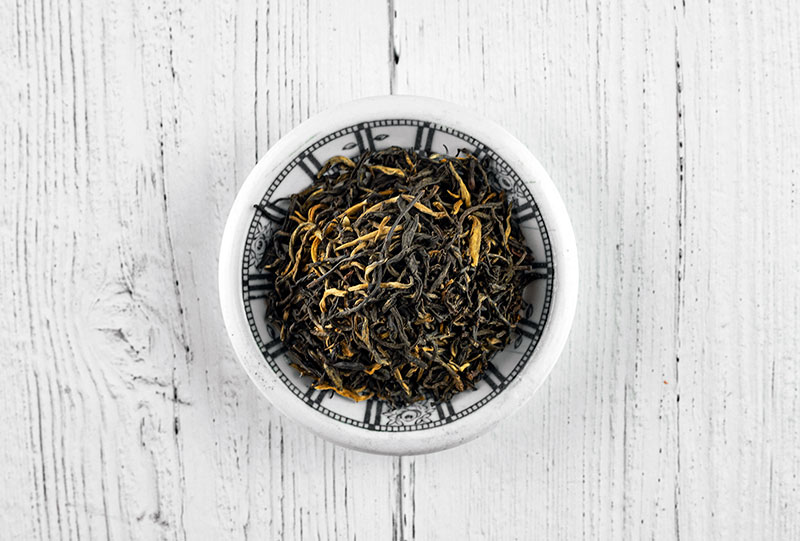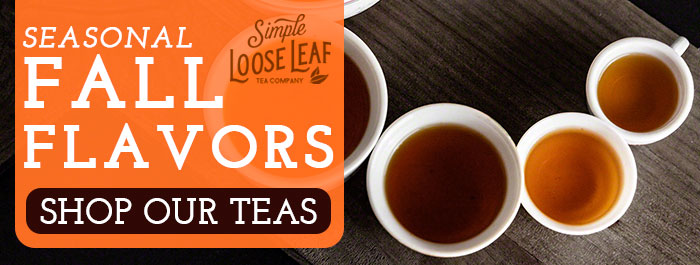Yunnan Black Tea Guide: Benefits, Caffeine, Where to Buy
If you are used to a morning blend or Assam tea, Yunnan black tea may come as a real surprise. With much more sweetness and a completely different flavor profile, Yunnan can be a perfect dessert tea, and a perfect choice for a soothing afternoon cup.
Yunnan is a home to thousands of teas, all very different, but with a distinguishable flavor profile. In other words, you’ll know Yunnan when you taste one. Read what exactly is Yunnan Chinese black tea, how much caffeine it contains and what are the potential benefits.
What is Yunnan tea?
Yunnan teas are any teas produced in the Chinese Province of Yunnan. Many exquisite teas are grown in this province, including the famous dark Pu erh tea, some green teas, white and even oolong types. The most popular types are white, black and dark.
However, what’s mostly hidden under the name of Yunnan tea is a black dian hong tea. Dian hong actually means red tea from Yunnan, and today is used to refer to most of Yunnan black tea. Chinese word dian is the abbreviation for the Yunnan province, and hongcha means red tea, or what is known as black tea in the western countries.
Yunnan black teas very often have a strong flavor, but with a dose of honey-like sweetness and sophistication. They have a light smokiness and earthiness, much more sweetness than other black teas, and may have honey, tobacco, malty and chocolate notes. In fact, chocolate notes in Yunnan teas can be so strong you could think you are drinking a flavored tea.
The unique tea plant
Unlike most Chinese green teas from Camellia sinensis var. sinensis, Yunnan black teas (or green) are made from mostly three different tea plants – Camellia taliensis, hybrid of taliensis and sinensis, and camellia sinensis var. Assamica. And, this is the first sign how special they are. Although it’s common to say that all real teas come from Camellia sinensis, some real teas can also come from different camellia plants – such as Camellia taliensis in the case of Yunnan tea.
Caffeine content
Generally, Yunnan teas may have less caffeine than broken Assam black teas. However, it’s impossible to say how much caffeine each cup will have. The levels will depend on many factors, such as tea plant used for making tea, growing conditions, how young/mature the leaves are, the way they are processed and ultimately, how you brew it. You may expect around 30-60 mg of caffeine per cup of Yunnan black tea, but don’t take this number as a definite amount.
Yunnan is the home of the most beautiful black teas too. Most of them are covered in golden hair and look very different from your regular black tea. The more golden tips Yunnan teas have, the higher the caffeine content. Buds contain more caffeine than older mature leaves. However, compared to Assam teas, Yunnan teas are less often broken. That also plays a part in the final caffeine content. Therefore, it’s likely that the average breakfast tea blend, especially made from smaller particles and Assam teas in tea bags, will have more caffeine than loose leaf tea from Yunnan.
Benefits of drinking Yunnan tea
The benefits of Yunnan black tea are similar to those of other black teas. Furthermore, the exact location where the tea is grown will have an impact on the total levels of beneficial compounds. Black tea may help in lowering blood sugar, bad cholesterol, improve blood pressure, decrease inflammation, offer anti-cancer benefits and reduce the risk of heart diseases[1].
How to brew Yunnan tea
You can brew Yunnan tea using both eastern and western brewing technique. If you really want to experience what these teas have to offer, use a multiple steeping technique and start with 20-30 seconds steep, increasing the time for every subsequent infusion. Use about 4-6 grams of tea leaves per 150 ml of water. Always use freshly boiled spring water and let it cool for a few seconds while you are preheating your teaware. Preheat it by pouring a boiling water into the empty teapot and out after a few seconds. Preheating the teaware will give you the opportunity to experience the strong scent of dry leaves too.
To brew Yunnan black tea using western method, use about 2-3 grams of tea per cup of water. Bring water to a boil and let it cool for a few seconds. Temperature should be around 208-210 °F. Steep for about 2-3 minutes. You can try re-using the same leaves one or two times more.
Although you may use boiling water too, it’s always better to let it cool for a few seconds before steeping the tea.
How does Yunnan tea tastes like?
Most Yunnan black teas are unlikely to be bitter, even when overstepped. It’s always a good idea to experiment with different steeping times, leaf to water ratios and water temperatures. Unlike Assam teas, Yunnan teas are likely to give a cup of golden-yellow to orange and orange-red tea. The color is very different from the brownish red color of Keemun tea or red color of Assam teas. Those with more yellow buds, or high quality loose leaf tea made from buds only, will most likely be sweet and smooth, more suitable for a slow enjoyment than as a fast cup of morning tea. Yunnan tea is often full bodied, but mellow and smooth.
Where to buy Yunnan tea
Today, Yunnan tea is widely available from many online shops, traditional tea shops, online marketplaces such as Amazon and even some supermarkets.
Different types of Yunnan teas are available in our tea shop:
Disclaimer: This article is for informational purposes only. It’s not intended to replace medical advice, diagnosis or treatment. Every person is different and may react to different herbs and teas differently. Never use teas or herbs to treat serious medical conditions on your own. Always seek professional medical advice before choosing home remedies.




